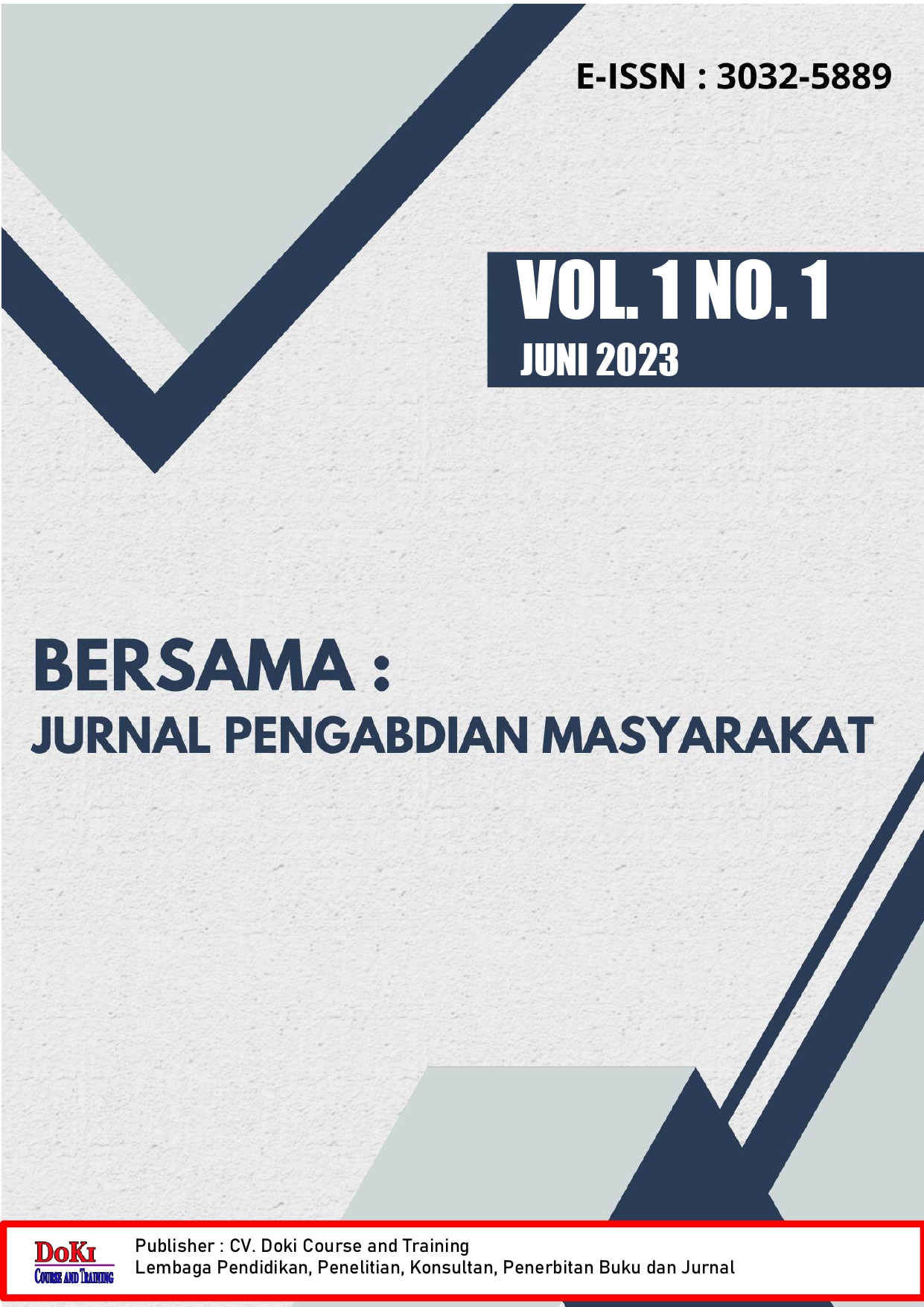E-BUSINESS-BASED ENTREPRENEURSHIP TRAINING DURING THE PANDEMIC
DOI:
https://doi.org/10.61994/bersama.v1i1.209Keywords:
E-Business , Pandemic , EnterpreneurshipAbstract
This article discusses the understanding of MSMEs to implement E-Business to deal with declining sales due to the pandemic, The purpose of this training is to provide education and the level of awareness of MSMEs about the need for E-Business in implementing sales. The method used in this project is to use a quasi-experimental design with a pretest-posttest group design, by providing material to participants who take part in the training, then providing questionnaires to participants regarding entrepreneurial knowledge before and after the provision of material. In using E-Business, MSME training participants can utilize popular platforms such as Instagram and Facebook to promote their products with visual content such as attractive photos and videos. Meanwhile, in marketplaces such as Shopee and Tokopedia to sell products online and facilitate the transaction process for customers. In addition, by applying the concept of E-Business, MSME participants can keep up with the rapid development of technology and take advantage of the growing online business opportunities.
References
Akbar, D. A., & Lidyah, R. (n.d.). KAJIAN FILSAFAT ILMU TERHADAP EKONOMI ISLAM. 69–89.
Amalin, R. L., SA, R., & Maftukhatusolikhah. (2023). The Role of Indonesia’s Islamic Philanthropic Institutions in Poverty Alleviation During the Covid 19 Pandemic 2022. Ilomata International Journal of Social Science, 4(3), 403–418. https://doi.org/10.52728/ijss.v4i3.825
Antasari, R. R., Nilawati, N., Adib, H. S., Sari, R. K., & Sobari, D. (2022). Gender Mainstreaming Problems in Student Organizations at Islamic Religious Colleges. AL-ISHLAH: Jurnal Pendidikan, 14(2), 2161–2172. https://doi.org/10.35445/alishlah.v14i2.1402
Anwar, D., Juniawati, M., & Muwazir, M. R. (2023). Potential Analysis of Zakat in Sharia Banking For Alleviating Poverty. Ikonomika : Jurnal Ekonomi Dan Bisnis Islam, 8(2), 21–32. http://ejournal.radenintan.ac.id/index.php/ikonomika/article/view/16554
Aulia, N., Randi, R., Alfatiha, M. R., Islami Fatoriq, H., & Panorama, M. (2021). Studi Pemulihan Dan Pengembangan Ekonomi Kreatif Sub-Sektor Kuliner Pasca Pandemi (Covid-19) Dalam Menunjang Pertumbuhan Ekonomi Di Provinsi Sumatera Selatan. Berajah Journal, 2(1), 177–187. https://doi.org/10.47353/bj.v2i1.71
Azwari, P. C., & Jayanti, S. D. (2022). Impact of Third-Party Funds and Capital Adequacy Ratio on Profit Shar- ing Financing. International Business …, 6(1), 63–70. https://journal.stebilampung.ac.id/index.php/ibarj/article/view/236%0Ahttps://journal.stebilampung.ac.id/index.php/ibarj/article/viewFile/236/154
Azwari, P. C., Naz’aina, Barkah, Q., Nuraliati, A., Taufik, A., Rizki, M., & Mulyani, N. (2023). Organizational Culture, Financial Reporting Quality, and Good Governance: Evidence From Islamic Financial Institutions. Corporate Governance and Organizational Behavior Review, 7(3), 131–143. https://doi.org/10.22495/cgobrv7i3p11
Barkah, Q. (2014). Kedudukan Dan Jumlah Mahar Di Negara Muslim. AHKAM : Jurnal Ilmu Syariah, 14(2), 279–286. https://doi.org/10.15408/ajis.v14i2.1286
Barkah, Q., Chalidi, C., Rochmiyatun, S., Asmorowati, S., & Fernando, H. (2023). The Manipulation of Religion and The Legalization of Underage Marriages in Indonesia. Samarah, 7(1), 1–20. https://doi.org/10.22373/sjhk.v7i1.13316
Barkah, Q., Huzaimah, A., Rachmiyatun, S., Andriyani, & Ramdani, Z. (2022). Abandonment of Women’s Rights in Child Marriage; An Islamic Law Perspective. Al-Ihkam: Jurnal Hukum Dan Pranata Sosial, 17(2), 383–411. https://doi.org/10.19105/al-Ihkam.v17i2.6725
Bayumi, M. R., & Diem, M. J. (2023). Sharia Business Ethics Fight for a More Sustainable Post-Pandemic Recovery. 4(3), 890–909.
Bayumi, M. R., & Jaya, R. A. (2018). Building Integration and Interconnection in Islamic Economic System To Create Islamic Solutions in Solving Social Problems. Share: Jurnal Ekonomi Dan Keuangan Islam, 7(1), 59–80. https://doi.org/10.22373/share.v7i1.2293
Emiliani, F., Sabilla, R., Ryan, S., Navira, N. M., & Risna, Nurmahfidhoh, Muhammad Alhada Fuadilah, H. (2021). ANALISIS PEMBERDAYAAN UMKM PADA MASA PANDEMI COVID-19. SOSEBI: Jurnal Penelitian Mahasiswa Ilmu Sosial, Ekonomi, Dan Bisnis Islam, 83(1), 2808–7089.
Hartini, T. (n.d.). An. 137–150.
Huzaimah, A., Abdillah, M., Laila, N. Q., Tamudin, M., & Puji Astuti, T. M. (2023). Disregarding the Reproductive Rights of Women in Child Marriage in Indonesia. Samarah, 7(2), 1097–1120. https://doi.org/10.22373/sjhk.v7i2.17392
Huzaimah, A., & Aziz, S. (2018). Urgensi Penerapan Lembaga Dwangsom (Uang Paksa) Pada Perkara Hadhânah di Pengadilan Agama dalam Perspektif Maqâshid al-Syarî’ah. Al-’Adalah, 15(1), 125. https://doi.org/10.24042/adalah.v15i1.3383
Ikhsan, A., Panorama, M., & Badaruddin, K. (2023). Self Accounting System Dalam Perspektif Al- Qur ’ an : Sarana Pendidikan Untuk Mewujudkan Manusia Sebagai Khalifah Dimuka Bumi. 2457–2470. https://doi.org/10.30868/ei.v12i03.4443
Joeliaty, J., Sya’diah Arrifin, S. D., & Sarasi, V. (2023). Pemberdayaan Masyarakat Melalui Evaluasi Pelatihan Umkm Berbasis Digital. Jurnal Kajian Budaya Dan Humaniora, 5(1), 72–78. https://doi.org/10.61296/jkbh.v5i1.107
Lidyah, R., Mismiwati, Hartini, T., Akbar, D. A., Africano, F., & Anggreni, M. (2020). The Effect of Audit Committee, Independent Commissioners Board And Firm Size on Audit Delay Through Capital Structure as An Intervening Variable In Sharia Bank. PalArch’s Journal of Archaeology of Egypt/Egyptology, 17(7), 11313–11325.
Luqman Hakim, M., Mitra, P., Nabila, F., Al-Badawi, A., & Panorama, M. (2021). the Role of Ziswaf’S in Restrukturing Indonesia Economy in Covid-19 Era. Berajah Journal, 2(1), 167–176. https://doi.org/10.47353/bj.v2i1.70
Maliah, & Panorama, M. (2022). The Role of Neutral Information and Accounting Information of Women Investors in Investing in the Sharia Capital Market. International Journal of Economics, Business and Management Research, 06(01), 26–40. https://doi.org/10.51505/ijebmr.2022.6103
Mismiwati. (2020). INVESTIGATION OF PROFIT SHARING AND FINANCIAL PERFORMANCE TO PROFIT DISTRIBUTION MANAGEMENT Mismiwati. This Study Was Conducted to Determine the Effect on Profit Distribution Management Recorded in Bank Indonesia on Financing for Profit Sharing and Performance. This Research Aims to Analyze: 1. Effect of Profit Sharing on Profit Distribution Management; 2., 2507(February), 1–9.
Mismiwati, M., Haryadi, H., Arum, E. D. P., & Lubis, T. A. (2022). The role of profit management in mediation of financial performance and transparency towards profit distribution management in sharia commercial banks. International Journal of Research in Business and Social Science (2147- 4478), 11(1), 138–151. https://doi.org/10.20525/ijrbs.v11i1.1541
Muhammad Syarifati, B., & Panorama, M. (2022). Maysir Element Analysis in Binary Option Platform Case Study of Iq Option Application. Indonesian Journal of Multidisciplinary Science, 1(10), 1202–1210. https://doi.org/10.55324/ijoms.v1i10.182
Mustafa, J. A., Bani Atta, A. A., Bani Ahmad, A. Y., Shehadeh, M., & Agustina, R. (2023). Spillover Effect in Islamic and Conventional Fund Family: Evidence from Emerging Countries. WSEAS Transactions on Business and Economics, 20, 1042–1059. https://doi.org/10.37394/23207.2023.20.95
Panorama, M. (2017). International Journal of Economics and Financial Issues Effect of Monetary Aspects on the Performance of Islamic Banks in Indonesia. International Journal of Economics and Financial Issues, 7(4), 76–85. http:www.econjournals.com
Panorama, M., Cahaya, P., & Muhajirin, A. (2022). Analysis of Community Development Programs through social and economic mapping in Kertapati Village , Palembang , South Sumatra , Indonesia. 27(4), 40–46. https://doi.org/10.9790/0837-2704014046
Pratama Porwokerto, P., Nurriqli, A., Lestari, W., Islam Negeri Raden Fatah Palembang, U., & Pancasetia Banjarmasin, S. (2023). International Journal of Economics and Management Research Liquidity And Leverage’s Impact On Profitability From 2018 To 2022.
Rusdi, M., & Tjahjono, H. K. (2023). Does Extraversion, Agreeableness and Collectivism Leverage Levels for Job Involvement? Jurnal Minds: Manajemen Ide Dan Inspirasi, 10(1), 155–171. https://doi.org/10.24252/minds.v10i1.35537
Safitri, R., Lidyah, R., & Rachmania, R. (2022). Profitability, Good Corporate Governance, Dividend Policy, and Firm Value at ISSI. Etikonomi, 21(1), 139–152. https://doi.org/10.15408/etk.v21i1.16524
Syariah, P. S. P. (2022). PELATIHAN KEWIRAUSAHAAN BERBASIS E-BUSINESS DALAM MASA PANDEMI. 1–23.
Wijoyo, H., & Widiyanti. (2020). Digitalisasi Usaha Mikro, Kecil dan Menengah. Prosiding Seminar Nasional Kahuripan I Tahun 2020, 1, 9–13
Downloads
Published
Issue
Section
License
Licensing

This work is licensed under a Creative Commons Attribution-NonCommercial-ShareAlike 4.0 International License.









